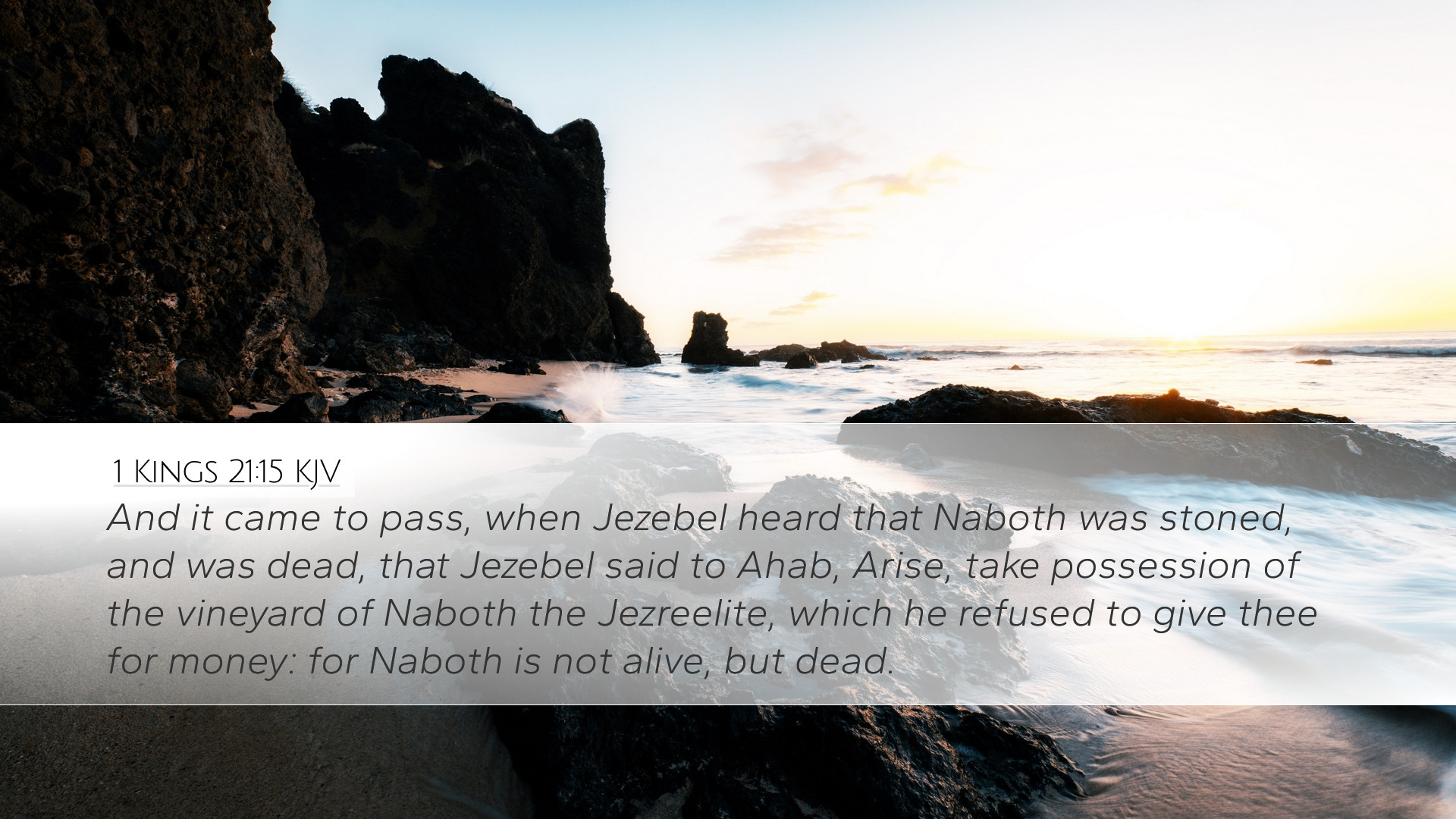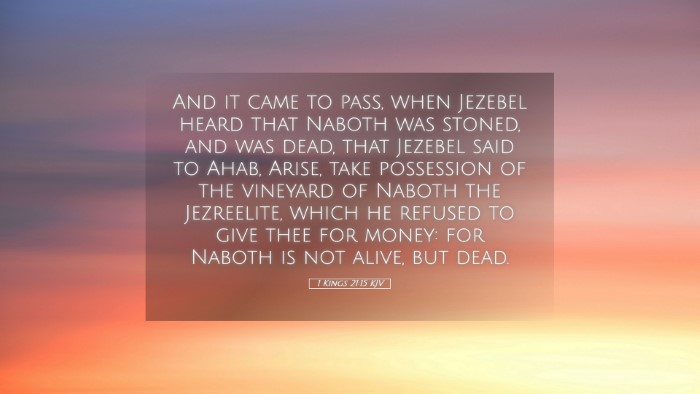Commentary on 1 Kings 21:15
Bible Verse: "And it came to pass, when Jezebel heard that Naboth was stoned, and was dead, that Jezebel said to Ahab, Arise, take possession of the vineyard of Naboth the Jezreelite, which he refused to give thee for money: for Naboth is not alive, but dead."
Introduction
This verse marks a crucial moment in the narrative of King Ahab and his infamous wife Jezebel. It encapsulates a broader theme of corruption, injustice, and the consequences of moral failure. Not only does it reflect Jezebel's ruthless ambition, but it also illustrates the darker aspects of leadership and the ease with which evil can flourish when power is unchecked.
Contextual Analysis
Historical Background: The incident revolves around Naboth, a man of faith in God's laws. He owned a vineyard adjacent to Ahab's palace, and Ahab's desire for it represents a lust for power and possession that leads to dire consequences. This passage must be understood in light of Israel's covenant relationship with God and the significance of land ownership in that context.
Insights from Commentaries
- Matthew Henry: Matthew Henry emphasizes the injustice of Naboth's murder and the moral bankruptcy of Ahab and Jezebel. He notes that their actions exemplify how persistent ambition can override ethical considerations. According to Henry, the text serves as both a warning and an exhortation against the desires that lead to sin.
- Albert Barnes: Barnes reflects on the providence of God and how divine justice is ultimately served. He points out the stark transition from Naboth’s resistance to Jezebel’s wicked machinations, illustrating a powerful contrast between righteousness and wickedness. Barnes argues that God's plan unfolds even amidst human misconduct, reminding that He will not overlook such atrocities.
- Adam Clarke: Clarke offers a deep exploration of the character dynamics at play, particularly focusing on Jezebel. He highlights her role as a manipulator and the embodiment of moral evil, contrasting her with Naboth's integrity. Clarke's commentary on this verse aligns with a broader theological debate about the influence of strong personalities in leadership and their capacity to lead others astray.
Thematic Considerations
This verse raises several critical themes that warrant exploration:
- Corruption of Power: The dialogue between the empowered agents—Jezebel to Ahab—reveals how political power can corrupt moral integrity. This theme is prevalent throughout the scriptures and serves as a reminder of the inherent dangers in governance disconnected from ethical principles.
- Injustice and Retribution: The account of Naboth’s wrongful death serves as a somber foreshadowing of divine retribution. The narrative progresses to highlight that while immediate justice may seem delayed, it is ultimately assured through God's higher judgment.
- Manipulation and Coercion: Jezebel’s ruthlessness showcases the dark potential of personal ambition to incite violence against those who stand for integrity. Her influence over Ahab exemplifies how individuals can be led to perpetrate evil, reflecting the perils of misplaced loyalty and trust.
- Faithfulness vs. Idolatry: The stark contrast between Naboth's adherence to God's commandments and Ahab's surrender to worldly desires invites a reflection on what it means to remain faithful amid moral crises.
Reflection for Ministries
This passage offers a rich platform for pastoral reflection and teaching:
- Ethical Leadership: The exploitation illustrated in this account can be utilized to discuss the responsibilities of leaders to uphold justice. Pastors and church leaders should strive to serve with integrity and transparency, positioning themselves against the practices of oppression.
- Standing for Righteousness: Naboth's stance, even in the face of death, becomes a testament to the power of conviction. This should inspire believers to be courageous in their faith, standing firm against societal pressures to conform to sinful norms.
- The Consequence of Sin: Teaching on the fewer immediate repercussions of sin emphasizes that God's justice may come in His timing. This serves as both a comfort and a warning to congregants about the trajectory of immorality and divine retribution.
Conclusion
The narrative encapsulated in 1 Kings 21:15 invites profound reflection on the nature of power, the severity of injustice, and the unwavering ultimate sovereignty of God. It serves as a reminder of the grave consequences of sin, outlining a clear path for believers and leaders alike to engage with the principles of righteousness, integrity, and justice before the Lord.


